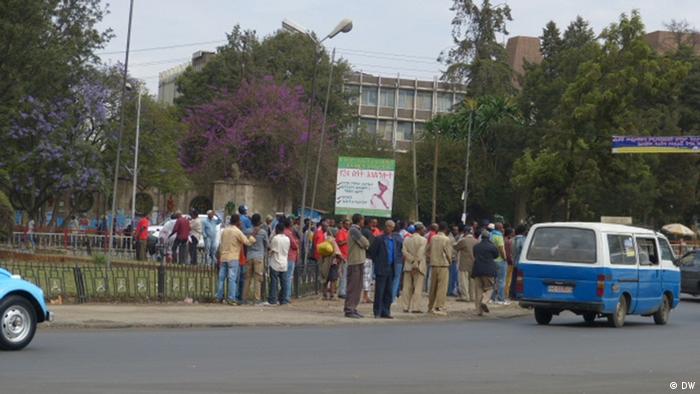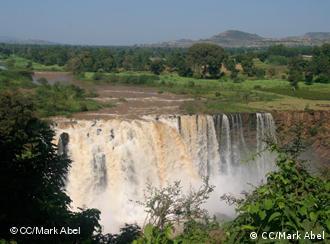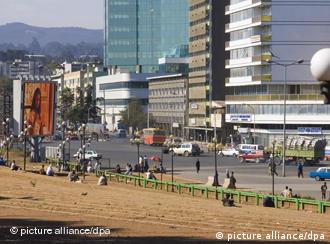The Oromo and the Ethiopian state: identity, marginalization and diaspora blues

(Image credit: OPride)
March 20, 2013 (This is Africa) — “I am Bekele Gerba” reads an image created by
OPride, an
Oromo news and analysis website based in the United States and run by diasporic activist and journalist
Mohammed Ademo. [The
Oromo are an ethnic group found in Ethiopia, northern Kenya, and parts of Somalia.] Gerba, an English teacher at Addis Ababa University, is a political prisoner in Ethiopia and a leader of the
Oromo Federal Democratic Movement (OFDM), an opposition party. Along with another Oromo leader Olbana Lelisa, Gerba was
arrested on August 27th, 2011 for his political activism, specifically for
allegations of association with the Oromo Liberation Front (OLF).
[Outlawed by the Ethiopian government and labeled a terrorist organization, the
OLF was established in 1973 by Oromo nationalists to promote self-determination for the Oromo people against what they call "Abyssinian colonial rule".] In response to his continued imprisonment, there have been
recent protests, organized and conducted primarily by the substantial Oromo diaspora living in the United States and Europe. In Washington D.C. and London, for instance, hundreds took part in recent demonstrations and rallies, calling for the release of political prisoners in Ethiopia. Profiles of some of of these Oromo prisoners – many of them parents, students and professionals – can be found
on the OPride website

The Oromo, with an estimated population of 40 million, are the single largest ethnic group in Ethiopia and the Horn of Africa. Despite their numerical majority, they have historically been subjected to political, social, and cultural injustices. Systematic discrimination against Oromo people has left them politically disenfranchised even today, although they have struggled against oppression since the formation of the modern Ethiopian state. There are currently an estimated
20,000 Oromo political prisoners in Ethiopia, lending an urgency to the political situation. The arrest and treatment of these prisoners has been strongly criticized by international human rights organizations like
Amnesty International and
Human Rights Watch.

The Amnesty International report on the Ethiopian crackdown on political dissent focuses heavily on Oromo prisoners, and specifically details the use of torture against prisoners at the
Maikelawi detention center, the use of information obtained through the use of torture in trials, and the continued imprisonment of members of Oromo opposition parties like the
Oromo Federalist Democratic Movement (OFDM) and the
Oromo People’s Congress (OPC).
Oromo identity, although often politicised due to marginalization, is about more than politics, though; the experiences of Oromo immigrants in the West are strongly related to ideas of transnationalism, for example. To learn more about diasporic Oromo activism and identity I spoke with Lensa Ahmed, a young scholar and Oromo activist who participated in the Washington
D.C. rally on behalf of Oromo prisoners. Her thoughts on identity, solidarity and diaspora will not be unfamiliar to young Africans from other countries. A great deal of Oromo activism comes out of the Oromo diaspora, as exemplified by the protests in D.C. and London, but the lives of those immigrants and their children have also been affected by living in the West and the experience of becoming diasporic. Lensa explains, for example, many of the Black American influences on her own thought and work, as well as the difficulty of identifying as Oromo in the United States. From this purview, she interrogates meanings of Ethiopian identity, unity and multiculturalism in both the United States and Ethiopia.
What does being Ethiopian mean to you?
Ethiopia is a country that is very misunderstood. When people outside of Ethiopia, particularly other Africans and those in the West, hear about it, it stands as a symbol of African pride, as a country that successfully fought off colonialism. Ethiopia is often described as the only African country that has never been colonized by Europeans. While this is partly true, the relationship between Ethiopia and European colonizers is much more intimately complex. Although Europeans did not colonize Ethiopia formally, they have had immense influence over the country’s founding and its subsequent history. Ethiopia was formerly known as Abyssinia, but came to be in its current form as a result of Abyssinian expansion South. So early Ethiopian leaders formed a sort of neo-colonial relationship with European colonizers through which they were able to expand their territories South. As a result, we have over 80 nations and nationalities in the country.
Despite Ethiopia’s diversity, the people of the North have dominated the country politically, culturally and socially. It is only recently that Ethiopia’s numerous ethnic groups have been able to openly share and celebrate their cultures. The violent assimilationist policies pursued by the Ethiopian state have left deep and painful memories in the minds of the people. Which is why today many Oromos in the diaspora refuse to self-identify as Ethiopian.
What gets lost in the dominant narrative on Ethiopia is this complex history and how it impacts current Ethiopian politics. Understanding Ethiopian history is important for understanding current Ethiopian politics.

The sycamore tree, under which traditional councils are held, is a symbol of Oromo governance and participatory democracy
Oromo people are the largest ethnic group in the Ethiopian state but remain politically marginalized. Many of us in the diaspora resist the label “Ethiopian” for one reason or another. For some of us, it is political, while for others it simply does not reflect our lived experiences. I grew up as an Oromo; I spent most of my life outside of Ethiopia but I grew up speaking
Afaan Oromo and listening to Oromo music, and in my family we never really identified as Ethiopian. I have friends who spent much of their lives in Ethiopia and remain fiercely against the idea of being categorized as “Ethiopian.” But I also have Oromo friends who identify as Ethiopian. Ethiopia’s complicated history affects how different people see themselves even today. This is even more pronounced amongst young people who might not understand or be confused about all of the complexity surrounding the many identities.
When I was 13 or 14, we lived in the same building as Oromo singers who were in exile in Kenya. After the
EPRDF (the current regime) consolidated power in the early 1990s, a lot of Oromo people, including activists and artists, fled the country amidst ensuing violence. As a way of empowering themselves and their Oromo compatriots, the exiled singers used to put on these concerts. One of my fondest childhood memories is of these concerts and the feelings of euphoria and empowerment they provided. That kind of public cultural expression has largely been prohibited in Ethiopia. Even today, the Ethiopian government goes out of its way to control and
micromanage Oromo people’s social and cultural gatherings. Oromo musicians continue to face major censorship. Music has always been a form of resistance for Oromo people throughout history. So the diaspora provides a space for the rehabilitation, celebration and preservation, of our culture and identity. In Ethiopia, just being Oromo is a very political thing. In the diaspora, I can just be myself.
In the diaspora, at least in America, identity becomes even more complicated because the average American has no clue what Oromo is, or even where Ethiopia is located. So, sometimes, it is exhausting trying to explain where you are from or what your identity is. Often I just say that I’m Oromo, or explain I am from Ethiopia, or East Africa. A layer of invisibility accompanies being an immigrant in the United States, as issues of race and culture complicate identity. A lot of people in the U.S. would first consider me Black, then an immigrant, then maybe African, and finally, if I am lucky, I might have time to explain how I am from Ethiopia but do not necessarily feel Ethiopian. That’s part of living in a state like the U.S. The existence of a multitude of identities can sometimes complicate how we see ourselves and how others might see us.

Nehemiah Oromo Choir. (Photo credit: David Joles, Star Tribune.)
As a college student I took a lot of classes in which I was the only Black person, especially the only Black woman. In that context it didn’t matter that I was Oromo or even African, just that I was a Black woman. I’ve come to embrace these different identities, but I have also learned that they do not always mean the same things to others as they might to me. I am Black in America, so I also identify as African American. Without the struggles of Black people in America, I wouldn’t be here and that’s relevant to my experiences as an African immigrant. So, diasporic living entails negotiating multiple identities and communities.
Among Africans, particularly Ethiopians, other dynamics also come into play. For instance, there is an uneasy tension between those who choose to identify as Oromo and those who identify as Ethiopian. For one reason or another, I find that Ethiopians get bothered whenever I say I am Oromo. There’s an Ethiopian nationalist notion of “we’re all Ethiopian, let’s unite.” But how can we unite when there’s ongoing, systematic oppression of various groups of people within the Ethiopian state? Many people tell us, Ethiopia does not have an ethnic issue, but what explains the fact that more than half of the prisoners across Ethiopia are Oromo men and women? How can we explain the fact that being an Oromo alone can warrant suspicion and undue harassment from the Ethiopian government? A lot of Ethiopians try to talk about unity, but only on their terms. Unity happens between equals, so when they force their identity on me it is not unity: it is domination.

People often associate Oromo identity with secessionism, but that’s not always true. Some Oromo people do support independence, but others want to build a new Ethiopia, one that reflects the diversity and complex history of the country and allows our people more political power. We’re accused of being divisive just by identifying as Oromo, but we can’t erase our identity, history or our memories of oppression within the Ethiopian state. Ethiopia is a multi-cultural and multi-ethnic country, so we have to be open to the multiple possibilities of what being from Ethiopia might entail. No single group of people can maintain a monopoly on that.
–This is Africa

























